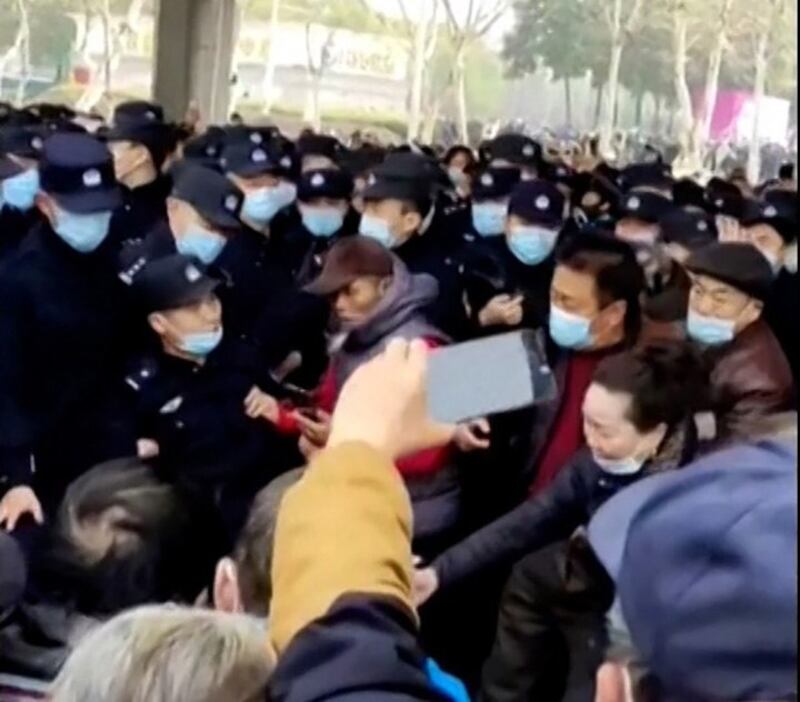Authorities in the central Chinese city of Wuhan have sent the case against COVID-19 rights activist Zhang Hai back to police '"for further investigation," amid fears he may have been placed in incommunicado detention, putting him at greater risk of torture and other forms of ill-treatment.
Wuhan state security police detained Zhang in the southern city of Shenzhen after he reposted video clips of the " silver" protests in Wuhan, along with media reports and comments to his Twitter account.
Zhang, who also campaigned for the rights of COVID-19 victims, was formally arrested in April for "picking quarrels and stirring up trouble," a charge frequently used to target peaceful critics of the ruling Chinese Communist Party.
Just before he was detained, he had publicly expressed support for recent protests by older people in his home city of Wuhan over cuts to medical insurance payouts.
Netherlands-based dissident Lin Shengliang, who is in contact with Zhang's family, said there are now fears that the authorities may be holding Zhang incommunicado.
"It's not out of the question that he was placed under 'residential surveillance at a designated location' prior to being locked up in the detention center in Hanyang," Lin told Radio Free Asia in a recent interview.
" Residential surveillance at a designated location" allows detainees to be held for up to six months without access to a lawyer, placing them at greater risk of torture to elicit a "confession," according to human rights groups.
No contact with lawyer
Zhang is currently being held in the Wuhan No. 2 Detention Center, and the authorities have refused to allow his family to hire their own lawyer, saying he will be represented by a government lawyer instead, Lin said.
"His family haven't been given any kind of documentation [relating to his case]," Lin said. "They've appointed a government lawyer for him, but they haven't allowed the lawyer to meet with him yet."
"I heard that they won't allow this while the police are still investigating the case," he said.

Lin said the municipal state prosecutor's office -- the procuratorate -- recently sent the case back for further investigation by police, something that usually happens when prosecutors want more evidence to substantiate a criminal charge.
"It's possible that the so-called facts of the 'crime' don't match the charge assigned to him," Lin said. "Another possibility is that the ... case has been sent back due to insufficient evidence."
He said if the case attracts the attention of higher-ranking officials as a result, it could be designated a priority case, used to make an example of someone.
"Maybe it's all part of the show they put on," Lin said, referring to the fact that Chinese courts almost never acquit political prisoners in similar cases.
Lin said the authorities are also putting huge pressure on Zhang's wife, making her consider divorcing him to protect the couple's child, whose access to housing and schooling could be affected by Zhang's prosecution.
"As far as I know, his wife is in Shenzhen, because they have a kid in school there," Lin said. "She is worried that this will affect their son, and that the authorities will put pressure on the child."
"As far as I know, she started out speaking up for Zhang Hai's rights, but now she is thinking about divorce so as not to impact the kid," he said.
'Silver' protest support draws ire
Wuhan-based activist Gao Fei said Zhang has likely been targeted due to his persistence in speaking out over his father's death, and for his support for the "silver" protests.
"Seeking justice for his father and supporting socio political movements are of course part of the reason," Gao said.
"I think the most important factor is that he has stood firm," he said. "If you confront them head-on, they will do the same to you, as a form of retaliation."
"They are always looking for people to help them meet their targets," he said.
Zhang, who hails from Wuhan but lived in Shenzhen at the time of his detention, became an outspoken critic of the ruling Chinese Communist Party since the pandemic prompted a city-wide lockdown in Wuhan and killed his father.
The authorities placed restrictions on his bank cards and on routine banking transactions in June 2022.
Since a nationwide crackdown on hundreds of rights attorneys and law firms in 2015, police have begun to put pressure on the families of those detained for political dissent to fire their lawyer and allow the government to appoint a lawyer on their behalf, in the hope of a more lenient sentence.
Zhang's detention came after thousands of people took to the streets of two Chinese cities – Wuhan and Dalian – on Feb. 15 in a second mass protest over major cuts to their medical benefits.
The protests were a continuation of an earlier rally outside municipal government headquarters in Wuhan on Feb. 8 against the slashing of medical payouts under an insurance scheme offered to retired employees of state-owned enterprises.
The ruling Chinese Communist Party's propaganda machine says the "silver protests" were the result of "rumor-mongering," and ordered police and local officials to carry out "ideological work" with people who attended the demonstrations.
Translated by Luisetta Mudie. Edited by Paul Eckert.
